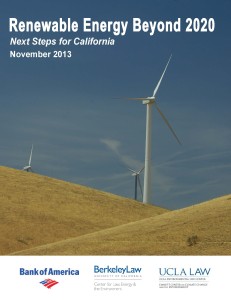UC Berkeley / UCLA Law Report on California Renewable Energy Policies Beyond 2020
Joint law school report will be discussed at a lunchtime forum today at UCLA Law
 California is among the world’s leaders in deploying renewable energy, with the state on pace to meet its target of achieving 33% of its energy from renewable sources like the sun and the wind by 2020. But the success may ironically be contributing to a stalled in-state market for more renewable power. Given the amount of renewables in the pipeline, utilities now have little incentive to procure more.
California is among the world’s leaders in deploying renewable energy, with the state on pace to meet its target of achieving 33% of its energy from renewable sources like the sun and the wind by 2020. But the success may ironically be contributing to a stalled in-state market for more renewable power. Given the amount of renewables in the pipeline, utilities now have little incentive to procure more.
To address the challenge and offer policy solutions for California’s electricity sector, UC Berkeley and UCLA Schools of Law are today releasing the report Renewable Energy Beyond 2020: Next Steps for California. The report resulted from a one-day gathering of renewable energy experts, including financial leaders, developers, utilities, and nonprofit advocates. It is the twelfth in the law schools’ Climate Change and Business Research Initiative, which develops policies that help businesses prosper in an era of climate change.
The report recommends that state policy makers consider adopting a 51% by 2030 renewable portfolio standard, provided that the new standard:
- Reduces greenhouse gas emissions from the electricity sector at a rate that tracks the state’s 2050 greenhouse gas reduction goal;
- Results from a comprehensive grid planning process that prioritizes renewable deployment in the most cost-effective locations; and
- Includes benchmarks that promote grid reliability and ratepayer benefits.
Among these recommendations, the report emphasizes the need to integrate the intermittent renewable energy without increasing greenhouse gas emissions, such as through energy storage, a western region-wide energy imbalance market, and demand response programs.
To hear more about the report and the topic, UCLA Law will be hosting a lunchtime panel presentation with:
- Ken Button, President, Verengo Solar
- Nicolas Chaset, Special Advisor for Distributed Energy Resources, Office of Governor Edmund G Brown, Jr.
- Jonathan Parfrey, Executive Director, Climate Resolve
More information on the event can be found here, including the registration page. The event will also include a summary of the report’s key findings.
Reader Comments
One Reply to “UC Berkeley / UCLA Law Report on California Renewable Energy Policies Beyond 2020”
Comments are closed.







Climate science lawyers up
By Lindsey Konkel
The Daily Climate
Time for climate scientists to lawyer up? One of the world’s premier science associations is offering the option.
The American Geophysical Union, representing more than 62,000 Earth, atmospheric and space scientists worldwide, has teamed with the Climate Science Legal Defense Fund to make lawyers available for confidential sessions with scientists at its annual meeting next month.
Legal counseling is not a typical agenda item for a science confab, but it’s become an important one in today’s political climate, scientists say.
The role of science in society is evolving, said AGU’s executive director Chris McEntee. As society faces more conflict over natural disasters, natural resource use and climate change, scientists increasingly find themselves in the spotlight, forced to communicate findings in ways they haven’t in the past.
more
http://wwwp.dailyclimate.org/tdc-newsroom/2013/11/climate-science-lawyers-up